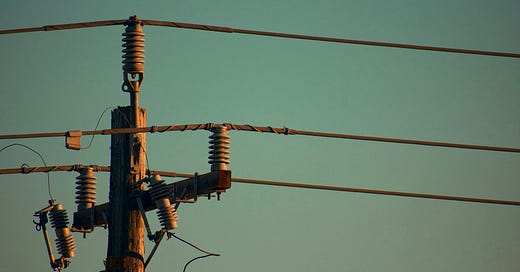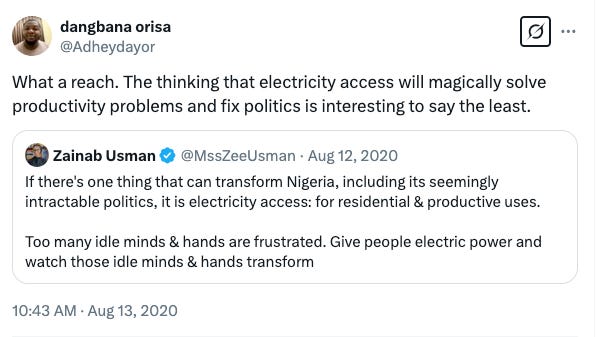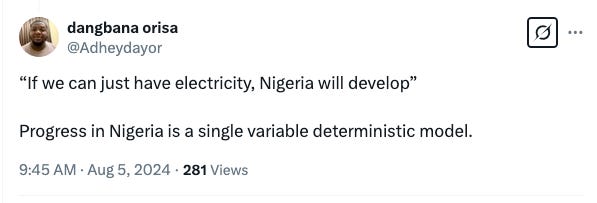24/7 electricity: yet another desperate search for a silver bullet
Progress in Nigeria is a single variable deterministic model
What is that one thing that Nigeria can fix that will radically transform the economy and lead to prosperity? I don’t know what it is but I know it is not 24/7 electricity.
I have a long running agenda against the thinking that “if we just fix electricity, Nigeria will develop” and similar ideas.
Sustainable growth and development is very complex and you cannot reduce it to one thing.
Here’s a screenshot from 2020 where I talked about this a bit. I’m too lazy to search my tweets, but I’m sure I have some before then.
Just because they have lived all their lives dreaming of uninterrupted power, many Nigerians think there is a simple equation for progress or development and all that the model requires is electricity. Or even corruption.
In this short essay, I’ll tell you why having 24/7 electricity is not enough for sustained growth.
#1 Electricity is just another important tool
I think we all know that it is impossible to develop without energy. Energy is important, but it is not all that matters nor is it the most important.
Typically, the most developed countries have the highest energy consumption.
Now did they develop because of access to electricity or did energy consumption rise as they created prosperity?
It goes both ways to an extent, but the second factor is more significant.
It is not only the availability of electricity that leads to the productivity boost that makes countries rich. It is mostly other things.
To start, electricity is useful. But once you have it, it doesn’t offer you much going forward in terms of productivity gains.
In fact, the long-term driver of economic growth is more things like technology/innovation and improved human capital, and much less physical capital like power infrastructure.
#2 Competitiveness is the key to growth and development
Why do I believe the impact of 24/7 electricity on growth is always exaggerated?
The most important reason is competitiveness. Whenever you imagine the world, even though there is a lot of global cooperation, know that there is intense competition. Cooperation is to ensure fairness, not to remove competition.
Countries must compete for everything.
People and countries that are more competitive win in everything. Poor countries have to compete with the rest of the world.
And poor countries cannot get rich without a source of competitiveness, because to get rich they must produce and sell for the world better than anyone else would.
For Africa to prosper, its industries must outcompete those in China and India in producing and selling goods and services globally.
Many countries in Africa, and in West Africa, have electricity supply close to 24/7, but they are a cautionary tale.
Why? Zero competitiveness.
#3 Only cheap, competitive electricity can have a big productivity boost
The economics of electricity matters. It does not matter that electricity is available 24/7, if it is not cheap or competitive relative to other countries, then it will not deliver a strong productivity boost.
Currently, band A electricity in Nigeria is ridiculously expensive. In fact, solar energy, despite its huge upfront capital, is now cheaper in some ways.
So, electricity is not competitive in Nigeria to even have an impact. This is because of our unstable macro environment with high inflation and a crippling exchange rate depreciation.
In short, if you rely on electricity provided by the Grid (band A) to produce anything for export, you are unlikely to be competitive in the exports market. And if you are competitive in producing for the world, it won’t be because of grid electricity.
So talk less about 24/7 electricity, but talk more about cheap, abundant 24/7 electricity that is competitive with anywhere in the world.
#4 Productivity gains from electricity is high when you do not already have electricity
Power from the grid in Nigeria rarely exceeds 5,000 megawatts (MW). But Nigerian businesses and consumers generate electricity in other ways through generators (running on gas, diesel, petrol etc), solar etc.
Our true electricity consumption is not 5MW, it is over 40,000MW if you include other sources of power.
The gains from having electricity when you don’t have it at all is much larger than when you have it already.
It is true that running generators is stressful and inconvenient and requires high capital costs, but remember point 3 above.
Unless, Nigeria makes electricity from the grid much cheaper than running generators or self-generation by consumers and businesses, there will be no significant gains.
#5 Productivity gains even when electricity is cheap and abundant is not sustainable unless matched with innovation
When you first have access to cheap, abundant electricity, consumers and business get automatic efficiency through cost savings.
Someone or a business paying so much for grid power or for solar power or for diesel and petrol to run generators see a cost reduction. That cost reduction can reduce their operating expenses and increase profit margins, all other things being equal.
But will it increase margins going forward? No. It is a one time boost in margins unless electricity continues to get cheaper. And that is not always the case. Electricity prices tend to rise over time and rarely fall.
But guess what can help? If there is a discovery of a new technology that reduces energy consumption, then you unlock another level of productivity. What helps countries to achieve this? High quality human capital, a culture of innovation, and the funding of R&D.
When we talk about sustained growth, this is what we mean. Anything capable of a sustainable impact on growth must provide a long-running productivity boost.
To use a very simple example, think of when you get a high salary increase. You are all excited and happy until three months later when your expenses adjust and you are looking for another boost to your income.
Will a one-off salary increase sustain you for life?
#6 Industrial/development policies matter to achieving gains
A Chinese or Nigerian producer given the same amount of electricity at the same cost will produce different things. Just like an educated and uneducated person will use a laptop or electricity differently.
Industrial and development policies determine what ideas are funded, the sectors to focus on, the sectors that receive all they need for success etc.
For countries to get rich or create mass prosperity, government policies and support matter. Because businesses from poor countries will struggle to compete with richer countries unless strongly backed by the government in the right way.
Nigerian leaders are not competent enough to even create a strong electricity market, not to mention policies that will enable Nigerian businesses to conquer the world.
#7 Other soft factors matter: macro stability (low inflation, stable exchange rates), security, the quality of human capital, the work culture, curiosity and innovation, quality of institutions and governance, justice, rule of law etc
Electricity does not automatically confer these things on countries, but correct me if I’m wrong.
#8 Many countries have 24/7 electricity in Africa. In fact, Nigeria is the poster child for unreliable grid power in Africa. Where is the prosperity in these countries?
Nothing in Nigeria suggests that we are unique. We are just as bad, if not worse than the average African country.
There is not a single thing that can unleash “cash” or prosperity. It is a combination of very hard, complex stuff.
We suck at these things and must do better to have any chance at prosperity.
So, no, having 24/7 electricity will not automatically make Nigerians rich.
Stop looking for silver bullets.









You have simply repeated your agenda without carving out fairly to explore any other pointers to this topic. You talk about many Africans having near 24/7 electricity supply and still being underdeveloped - I waited here in vain to see you list one with constant power supply whose per capital income has dwindled to $850.
It's clear that 24/7 power supply is not the only factor for development, but you forget that if you commit to achieving this as a country, it'll affect production. And why do you keep repeating yourself about 5000KW grid as though it cannot be improved on, or other sources of electric power explored if we're to have constant electricity?
Mention one developed country that has interrupted power supply to back your point on the other hand since you have supposed "many African countries" aren't doing better with 'near 24/7' power supply. Stop being intellectually dishonest. The countries who solved this primary energy source for their societies 100 years ago are not foolish. This factor alone puts every society on track to up its production economy.
Still, the other countries you may end up mentioning in Africa who aren't as developed with near constant electricity, I bet are still above Nigeria on many indices of growth. How do you factor power hasn't completely shaped their realities on the rise? If you want a model to answer this question, look at developed economies and confidently make your point about electricity not driving development. Abnormality has become norm, I cannot blame you or anyone thinking like this.
I agree with the points you raised in this article.
I’ve worked on electrifying rural communities and introducing productive uses of electricity, witnessing firsthand the impact going from 0 to 1 can have… aligning closely with your fourth point. I think this is where many assume Nigeria starts from: 0, but we’re definitely not at 0.
While electricity alone isn’t a silver bullet, I believe affordable electricity at scale can be one of the catalysts for wealth creation in Nigeria. Key word being: Affordable.